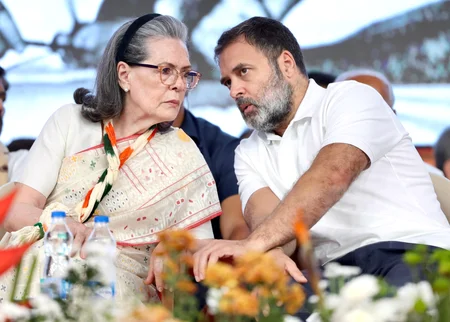The Enforcement Directorate (ED) has submitted a fresh report before the court asserting that several top Congress leaders, including Sonia Gandhi and Rahul Gandhi, were allegedly involved in orchestrating fake financial transactions in the National Herald case. The ED alleges that these transactions were part of a broader conspiracy to acquire control over Associated Journals Limited (AJL), the publisher of the National Herald newspaper, and to illegally transfer its assets to a privately held company—Young Indian.
According to the ED’s submission, the transactions lacked legitimate commercial rationale and were structured in a manner to misappropriate valuable real estate assets held by AJL across multiple cities in India. The agency claims that these assets, estimated to be worth over ₹2,000 crore, were indirectly acquired by Young Indian without appropriate compensation or adherence to corporate governance norms.
The ED’s report outlines how a series of financial arrangements—including unsecured loans, questionable share allotments, and undervalued transfers—were used to facilitate the alleged fraud. Investigators say that Congress party funds, raised for public purposes, were illegally funneled into AJL and later written off, creating grounds for the takeover by Young Indian.
Background of the Case
The National Herald case centers around allegations of financial misconduct in the acquisition of AJL by Young Indian Pvt Ltd, a company in which Sonia Gandhi and Rahul Gandhi are majority shareholders. AJL, founded by India’s first Prime Minister Jawaharlal Nehru, once published the National Herald newspaper. However, after publication ceased in 2008, its vast real estate holdings remained intact.
In 2012, BJP leader Subramanian Swamy filed a private complaint in a Delhi court, alleging that the Gandhis and other Congress leaders had misused party funds to acquire AJL through Young Indian. He claimed this amounted to criminal breach of trust, cheating, and misappropriation of property.
ED’s Allegations
The ED’s detailed filing to the court states:
-
Congress leaders provided an unsecured loan of ₹90 crore to AJL, which was later written off.
-
Young Indian acquired 99% of AJL’s shares for a mere ₹50 lakh, effectively gaining control of assets worth thousands of crores.
-
These transactions were allegedly designed to “mask” the true nature of the deal, which the ED believes amounts to money laundering under the Prevention of Money Laundering Act (PMLA).
The ED further alleges that the entire structure was created to benefit the Gandhis and a select group of leaders who had control over both the Congress party’s finances and the operations of Young Indian and AJL.
Political Reactions
Congress has consistently denied all allegations, claiming the case is politically motivated and aimed at harassing its top leadership. Party spokespersons argue that Young Indian was created to revive the National Herald and preserve its legacy, not to make profit.
In a statement released earlier, the Congress termed the ED’s actions as “a vendetta exercise” driven by the ruling party to deflect attention from national issues like inflation, unemployment, and social unrest.
Legal Developments
The Delhi court is currently hearing arguments on whether to frame formal charges against the accused. Sonia Gandhi and Rahul Gandhi have both appeared before the ED for questioning in the past year, and other Congress functionaries such as Motilal Vora (deceased), Oscar Fernandes (deceased), and Suman Dubey have also been named in the case.
The ED’s latest report is expected to add weight to the ongoing legal scrutiny and could lead to intensified judicial proceedings, including possible charges under PMLA provisions.
What’s Next?
The court has asked all parties to submit their responses by the next hearing date. If the court finds sufficient prima facie evidence, it may proceed with framing charges, leading to a full-fledged trial.
This case continues to remain a flashpoint in Indian politics, with implications for both legal accountability and political narratives as the country gears up for major state elections and the 2026 general election.



